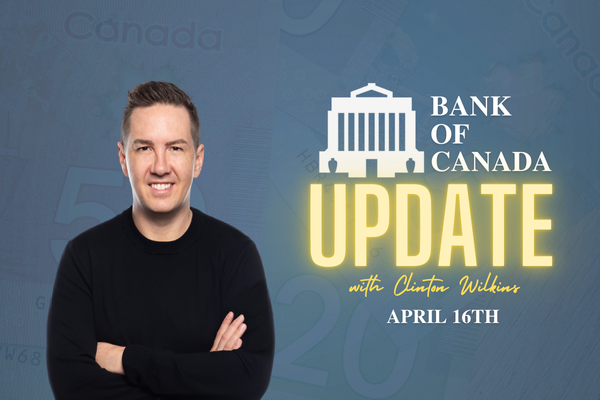On 95.7 News Radio, Clinton and Todd discussed the importance of credit monitoring due to rising fraud and data breaches.
CityNews 95.7 – property assessments and tax increases | January 25, 2022
Clinton Wilkins was on CityNews 95.7 with Todd Veinotte to talk about the rise in property assessments and what that means for your property tax increases. The guys talk about how these numbers are calculated and how borrowers should prepare for a change like this.
Clinton Wilkins & Todd Veinotte on CityNews 95.7: Property assessments and tax increases
Don’t feel like watching the video? Check out the transcript below.
Transcript:
Property assessments up 13 per cent in Halifax
Announcer: [00:00:01.58] When you need to know it’s the Todd Veinotte show on CityNews 95.7.
Todd Veinotte: [00:00:20.77] All right, residential property assessments are up almost 11 per cent in Nova Scotia, more than 13 per cent in Halifax. And a lot of people are upset about this, and rightfully so, as they await to what the property tax will fall, where that might potentially go, and it’s been talked about or floated as high as almost six per cent.
Although Council in HRM says for the most part, councillors say it’ll be less than that. Nonetheless, joining us to talk about all of this is our mortgage guru, Clinton Wilkins. Clinton, thanks for joining us today. We appreciate your time.
Clinton Wilkins: [00:00:53.91] Thanks for having me, Todd. How are you doing?
Todd Veinotte: [00:00:55.59] I’m well, are you?
Clinton Wilkins: [00:00:57.30] I’m doing well, just watching a little bit of snow fly by and you know, it’s January. So some people have had the Blues and I heard the other day was blue Monday. So hopefully this, you know, the tax situation, the assessments don’t have everybody down, but it’s definitely a hot topic.
Todd Veinotte: [00:01:15.96] Yeah, absolutely. So I guess it’s inevitable when you have property values going up. Let everybody know how this all works. It’s not the it’s not the municipality that sets the assessment, obviously, because that would be that would be a conflict. But let everybody know how this works, and who does it.
Property Valuation Services sets the values the municipality uses
Clinton Wilkins: [00:01:34.92] So in Nova Scotia, we have a corporation called Property Valuation Services, and they set the assessment. And the assessment is what the municipality uses to calculate how much tax you owe on your property. And the way that the Property Valuation Assessment Corporation works is typically they lag behind several years.
So although we’re seeing, you know, 11, 13 per cent plus increases in the property values, the value of that showing on the assessment is actually what’s represented from a value of two, three, four years ago. So I suspect in the coming years due to obviously the increases that everyone has, you know, benefited from, we’re going to see the assessments go up even more in the coming years.
So I think that’s something to take into account. This is not the last year that we’re going to see an assessment, Todd. I would expect that we’re going to see increases in this amount or more for, you know, the next several years. So this is really just the tip of the iceberg.
The increase in property tax is from property value increases years ago
Todd Veinotte: [00:02:40.65] So you’re saying these assessments aren’t based on what’s going on now, they’re based on what was happening years ago? Is that is that what you said?
Clinton Wilkins: [00:02:47.58] Yeah, it’s basically based on what was happening two, three, four years ago. So they’re behind in kind of those valuation increases, which is good in a sense that, you know, it gives us a little bit of time to prepare, Todd. You know, there’s nothing like, you know, a 30 per cent increase or 50 per cent increase in your assessment because obviously that would be quite detrimental to several households.
So we’re going to see some slow increases. And, you know, 10, 11 per cent increase in the assessment is a lot less than what the actual real property value is, if you were to sell your home or potentially refinance your home. That value increase probably more than that 10, 11, 13 per cent that you’re seeing in your assessment.
Todd Veinotte: [00:03:34.77] Are there some types of legislation that limits how much the assessment can go upwards. The sky’s the limit. Whatever this company deems?
Clinton Wilkins: [00:03:42.72] The sky is the limit. Now you can obviously challenge your assessment. There is a process to do that through property valuation services, and sometimes you might have a lever that you can do that. Obviously, if you get an appraisal on your property and the appraisal comes in less in the assessment, that’s really good. You know, evidence to maybe seek a reduction in the assessed value. By and large, though, Todd, the assessments in Nova Scotia are very, very low compared to the property values.
So I think that’s one thing to take into account. We see sometimes properties that have assessments at $300,000 that are selling at $600,000, so you’re only paying tax sometimes on a portion of what the real property value is. So I think that’s something to think about. The one thing that we’re doing with our clients, like we deal with mortgage lending all day, every day, that’s our core business.
Manage your tax account
And the one thing that we’re doing is we’re really trying to decouple the tax account from the mortgage. Obviously, lenders don’t do a great job at handling it any way, Todd. But where are the assessments are really going up very quickly and we expect for them to continue to go up quickly.
Clinton Wilkins: [00:04:48.09] You know, in the next several years and the tax rates in many municipalities are increasing, like what you mentioned. Many borrowers are going to be in a shortfall position in their tax account. So I think if the listeners do have a mortgage and they do currently have their lender managing that tax account for them, you need to expect that you’re going to be in a shortfall position and that can be really handled in two ways.
You can either do a lump sum payment into that tax account to basically bring it to zero and cover the shortfall. The lender is still going to increase your payment to take into account the increase in that tax bill. The other thing that you need to think about, if you don’t do that lump sum payment, the lender needs to collect the shortfall, but they also have to collect the new increased tax rate.
So many borrowers are going to see their portion of their mortgage payment really go up very significantly in terms of what’s going on with their property tax account.
How should a borrower handle this?
Todd Veinotte: [00:05:51.97] All right, so who who’s responsible for doing all of this? Is it the client that has to call the bank to proactively make these adjustments or who’s ultimately responsible?
Clinton Wilkins: [00:06:05.32] What will happen is if the borrower doesn’t make any action, doesn’t take any action in trying to, like, remedy the issue, the lenders will automatically adjust the mortgage payment. So they’ll arbitrarily adjust it to cover the shortfall and the increase in the property tax. So one day you may just see your payment go up significantly that comes out of your bank account. And sometimes we get the calls.
And we try to be proactive, we try to especially email anybody who we’ve done a mortgage for in the last several months when the property tax bills start coming out. It’s the one thing that people forget about. Obviously, you know, when you’re buying a new home, there’s so many moving parts Todd, you know, even just between the closing costs and inspections and all these things. And we hope that the mortgage pieces the easiest piece, but people often forget about the property taxes.
You know, borrowers are really bad at opening their mail. I can tell you, I’m the same. I don’t love opening my mail. You know, a lot of stuff comes online, but your property tax bill, you know, comes from the municipality in the mail. And in Halifax, you know, it says Halifax right on it. It’s blue.
But if you don’t open your mail and if you’re required to pay it, or your lender is required to pay it and it’s not paid, you’ll then get a notice. And I think oftentimes those notices are green. And I can tell you, I’ve seen many borrowers that, you know, either for forget to pay or don’t have the ability to pay or it’s supposed to go to their lender.
Clinton Wilkins: [00:07:33.97] And it takes a long time for the lender and the municipality to connect to update who the mortgagee is on the title. So sometimes there is a delay on getting that first property tax bill to your lender if the lender is collecting the property taxes on your behalf.
So if you bought a home this year or in the last 12 months, even if your lender is paying the property taxes on your behalf, you should open your mail because on the property tax bill, it’ll say if it’s been sent to your lender and it’ll say this is not a bill, don’t pay it, it’s been sent to your lender and it will say who your lender is. If you don’t see that on your property tax bill, you’re probably responsible for paying it, or you need to manually send it in to your lender to be paid. The one thing you want to look at is you want to see how much money is in your tax account.
So if you don’t have enough money in your tax account at your lender to pay that bill, you are going to be in that shortfall. And you’re either going to have to do that one time payment to bring it right or your lender is going to cover the shortfall and the increased amount. Probably in the next six months, you’re going to see a big kind of increasing your mortgage payment.
Next hot topic is the Bank of Canada announcement
Todd Veinotte: [00:08:45.47] Clinton, always a wealth of information, thanks so much, we’ll be chatting tomorrow as well late in the show with the Bank of Canada coming up and I’ve heard interest rates are going up. Have you heard that as well quickly?
Clinton Wilkins: [00:08:57.83] I don’t know. I think we will see tomorrow, Todd. Certainly, a lot of economists are thinking there’s going to be an increase tomorrow.
Todd Veinotte: [00:09:05.89] Yeah, with inflation.
Clinton Wilkins: [00:09:07.25] If there’s an increase or not, CIBC actually came out their, chief economist Benjamin Tal saying that he’s not so sure that they’re going to increase it tomorrow. So I know there’s going to be a lot of people watching. We certainly will be watching the announcement tomorrow at 11 a.m. and then I’ll be live with you in the afternoon and we’ll do a deep dive into what’s going on with the economy, Bank of Canada, and you know, I think there’ll be a lot of focus on what’s going on here with inflation.
Todd Veinotte: [00:09:33.17] Great stuff, Clinton. Appreciate it, as always, talk tomorrow.
Clinton Wilkins: [00:09:36.86] Thanks, Todd.
Todd Veinotte: [00:09:37.22] All right. Take care, Clinton Wilkins, our mortgage guru.
If you have any questions, get in touch with us at Clinton Wilkins Mortgage Team! You can call us at (902) 482-2770 or contact us here.


